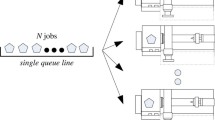Abstract
This research examines correlated parallel machine scheduling problems since they better reflect real world manufacturing environments. We consider the problem of scheduling correlated parallel machines to minimize makespan and scheduling correlated parallel machines with release times to minimize total weighted tardiness. We consider different levels and combination of machine correlations and job correlations in the processing times. Mathematical models are applied to evaluate the influence of machine correlation and job correlation on computation results and computation time. Computational results show that as the machine and job correlations increase, the problem instances become more difficult for mathematical models to solve. This implies that branch-and-bound based algorithms might have more difficulty solving parallel machine scheduling problems with correlations than without correlations. We can use this result to forecast branch-and-bound based algorithm performance on correlated parallel machine scheduling problems and thus improve process behavior by selecting the most suitable algorithms.









Similar content being viewed by others
References
Fanjul Peyro L, Ruiz R (2010) Iterated greedy local search methods for unrelated parallel machine scheduling. Eur J Oper Res 207(1):55–69
Glass CA, Potts CN, Shade P (1994) Unrelated parallel machine scheduling using local search. Math Comput Model 20(2):41–52
Graham RL, Lawler EL, Lenstra JK, Rinnooy Kan AHG (1979) Optimization and approximation in deterministic sequencing and scheduling: a survey. Ann Discret Math 5:287–326
Hall NG, Posner ME (2001) Generating experimental data for computational testing with machine scheduling applications. Oper Res 49:854–865
Hariri AMA, Potts CN (1991) Heuristics for scheduling unrelated parallel machines. Comput Oper Res 18:323–331
Lenstra JK, Rinnooy Kan AHG, Bricker P (1977) Complexity of machine scheduling problems. Ann Discrete Math 1:343–362
Lin YK, Lin CW (2013) Dispatching rules for unrelated parallel machine scheduling with release dates. Int J Adv Manuf Technol 67:269–279
Lin YK, Pfund ME, Fowler JW (2011) Heuristics for minimizing regular performance measures in unrelated parallel machine scheduling problems. Comput Oper Res 38(6):901–916
Lin YK, Pfund ME, Fowler JW (2014) Processing time generation schemes for parallel machine scheduling problems with various correlation structures. J Sched 17(6):569–586
Lo V, Mache J, Windisch K (1998) A comparative study of real workload traces and synthetic workload models for parallel job scheduling. In: Workshop on job scheduling strategies for parallel processing, pp 25–46. Springer, Berlin
Lu D, Dinda P, Qiao Y, Sheng H (2005) Effects and implications of file size/service time correlation on web server scheduling policies. In: 13th IEEE international symposium on modeling, analysis, and simulation of computer and telecommunication systems, pp 258–267. IEEE
Mirshekarian S, Šormaz DN (2016) Correlation of job-shop scheduling problem features with scheduling efficiency. Expert Syst Appl 62:131–147
Mönch L, Balasubramanian H, Fowler JW, Pfund ME (2005) Heuristic scheduling of jobs on parallel batch machines with incompatible job families and unequal ready times. Comput Oper Res 32:2731–2750
Panwalkar SS, Dudek RA, Smith ML (1973) Sequencing research and the industrial scheduling problem. In: Elmaghraby SE (ed) Proceedings of symposium on theory of scheduling and its applications. Springer, New York, pp 29–38
Pappu P, Wolf T (2002) Scheduling processing resources in programmable routers. In: INFOCOM 2002. Twenty-first annual joint conference of the IEEE computer and communications societies. Proceedings. IEEE, vol 1, pp 104–112. IEEE
Pinedo M (2016) Scheduling theory, algorithms, and systems, 5th edn. Prentice Hall, Upper Saddle River
Potts CN (1985) Analysis of a linear programming heuristic for scheduling unrelated parallel machines. Discrete Appl Math 10(2):155–164
Sousa JP, Wolsey LA (1992) A time indexed formulation of non-preemptive single machine scheduling problems. Math Program 54:353–367
Vredeveld T, Hurkens C (2002) Experimental comparison of approximation algorithms for scheduling unrelated parallel machines. INFORMS J Comput 14(2):175–190
Yajima E, Hara T, Tsukamoto M, Nishio S (2001) Scheduling and caching strategies for broadcasting correlated data. In: Proceedings of the 2001 ACM symposium on applied computing, pp 504–510. ACM
Author information
Authors and Affiliations
Corresponding author
Rights and permissions
About this article
Cite this article
Lin, YK. Scheduling efficiency on correlated parallel machine scheduling problems. Oper Res Int J 18, 603–624 (2018). https://doi.org/10.1007/s12351-017-0355-0
Received:
Revised:
Accepted:
Published:
Issue Date:
DOI: https://doi.org/10.1007/s12351-017-0355-0




